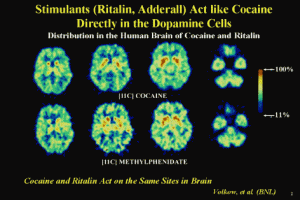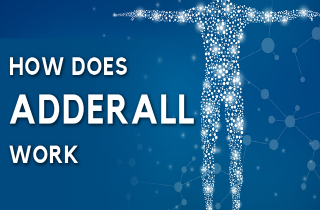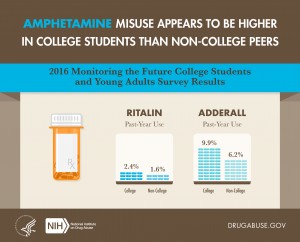ARTICLE SUMMARY: Adderall is a stimulant, psychoactive drug. It works by “speeding up” processes. As a side effect, it also increases the amount of dopamine and norepinephrine in the brain.
TABLE OF CONTENTS
- Physical Effects
- Negative Side Effects
- Brain Effects
- Onset of Effects
- Duration
- Effectiveness
- Mixing With Alcohol
- Tolerance
- Missing a Dose
- Dosing Guidelines
- Signs of a Problem
Physical Effects
In general, Adderall (amphetamine salts) work in the body by affecting the brain and nervous system. 20 -30 minutes after oral administration, users usually feel a rush of energy and clarity which focuses their attention and quiets their appetite. This focus boosting cocktail alerts your sensations giving your brain the impression that it’s incredibly powerful and working at maximum efficiency.
However, some users can also experience a mild euphoric lift. This is because the amphetamines in Adderall are stimulants that block the chemicals that temper reward-based responses. This side effect – Adderall can get people high – is the reason it’s been classified as a Schedule II drug in the Controlled Substances Act.
Negative Side Effects
When people take Adderall, they can also experience unpleasant, and sometimes dangerous, side effects. Most commonly, this includes stomach pain or headache. But even at normal doses Adderall can sometimes cause more serious adverse effects, including:
- hallucinations
- heart problems
- seizures
- shortness of breath
…or changes in behavior. There’s no way to predict who will experience these adverse effects, but they’re more likely to occur when Adderall is taken in a way other than directed by a doctor. You can report Adderall to the FDA through their online program, MedWatch.
Furthermore, it’s important to note that amphetamines like Adderall have a high potential for abuse. In fact, the FDA-approved label for Adderall warns that administration of amphetamines for prolonged periods of time may lead to drug dependence and should be avoided. The FDA further warns that, “Misuse of amphetamine may cause sudden death and serious cardiovascular adverse events.”
Brain Effects
The amphetamine salts found in Adderall are central nervous system stimulants. At its most basic level, Adderall works by increasing the amount of the neurotransmitters, dopamine and norepinephrine, in the brain. This is why people who use Adderall for non medical reasons may experience euphoric effect. And pursuing an Adderall high can get you addicted to amphetamines.
But therapeutic use of Adderall rarely develops into addiction. Adderall works in people with excessive sleepiness (narcolepsy) by stimulating the central nervous system. In people with ADHD, it has a paradoxical effect, helping them focus and remain calm. People using Adderall to treat ADHD won’t get “high” from their medication. Adderall’s stimulant qualities can affect the brain and nervous system and result in:
- difficulty with sleep
- nervousness
- restlessness

In a 2006 testimony before the Subcommittee on Criminal Justice, Drug Policy, and Human Resources Committee on Government Reform, United States House of Representatives, the National Institute of Drug Abuse Director, Dr. Nora Volkow explained the addiction potential of Adderall to be similar to cocaine. Additionally, doctors suggest that Adderall should not be used for more than a month because it might provoke drug dependence. Drug dependence is different than addiction, but can be a sign of it. To learn more, check out this Addiction Blog article on how people get addicted to Adderall.
Onset Of Effects
Adderall reaches its peak level in the blood in 1-2 hours. At that point, it has taken full effect. Sometimes people will crush and snort the powder from the tablets to try to get more immediate effects. Although possible, this practice is very dangerous. Snorting Adderall can result in increased adverse effects, overdose, or even sudden death.
Duration
Adderall stays in the body for several days, with a half life averaging around 10-11 hours. The extended-release formula will remain effective throughout the day, while the immediate release may need to be taken more frequently and is prescribed two or more times daily.
Effectiveness
Adderall works best when it’s taken exactly as prescribed by your doctor. Taking Adderall only when you feel you “need” it can actually make the medication less effective. Taking Adderall with large amounts of vitamin C may also lessen the effects of Adderall. However, Adderall can be taken on an empty stomach to get the best effect.
Adderall is addictive and should be avoided by people with a history of addiction.
Mixing Adderall With Alcohol
Contrary to popular belief, drinking alcohol with Adderall does NOT enhance Adderall effects. Instead, drinking while on Adderall increases your risk of alcohol poisoning and related accidents or death.
According to the Drug Abuse Warning Network (DAWN) Report, published on July 2, 2012 Adderall abuse became a serious concern in the U.S. because it leads many people to serious health problems including overdose. To be more precise, the statistics revealed that in 2010, there were over 31,000 emergency room visits due to stimulants abuse. These numbers mark a 196% increase from 2004.
Tolerance
Adderall should not be used as a long term solution. It is known to provoke tolerance, or the need for more amounts or more frequent dosing to achieve initial therapeutic effect. Studies of chronic Adderall administration as early as the 1980’s evidence this.
In the article titled, “Dopamine Dilemma,” author Dr. Jason Yanofski, MD built on the idea that Adderall may actually become less effective over time. His studies of the phenomenon of paradoxical decompensation in Adderall patients theorize that decreasing the brain’s sensitivity to dopamine is the opposite of what patients with ADHD need, and could theoretically lead to worsening of symptoms.
Furthermore, this stimulant has quite a reputation among the “highly addictive” prescription drugs. In theory, amphetamine salts shouldn’t be prescribed to anyone who doesn’t need it for a legitimate medical purpose due to the risks of side effects, including possible addiction. And in some people, Adderall can trigger serious side effects, particularly those with a history of seizures or cardiovascular conditions.
Missing A Dose
Medline Plus advises that if you happen to forget a dose you should take it as soon as you remember. However, if it is almost time for your next scheduled dose, than it’s best to skip the missed dose. Whatever you do make sure NOT to take Adderall before going to bed since it might cause sleeping problems.
IMPORTANT: DO NOT take extra medicine to make up your missed dose. Make sure you consult your doctor in case you forget a dose.
Dosing Guidelines
It is a recommended medical practice to start using Adderall at the lowest effective dosage. But in general, how much Adderall is safe for a person in terms of dosing is up to 40 mg per day for children, and 60 mg per day for adults. More or less dosage will depend upon physical tolerance to amphetamines.
The dosing regimen should always be adjusted according to a persons individual response and their therapeutic needs.
Adderall is available in the following forms and strength:
ADDERALL XR 5 mg capsules
ADDERALL XR 10 mg capsules
ADDERALL XR 15 mg capsules
ADDERALL XR 20 mg capsules
ADDERALL XR 25 mg capsules
ADDERALL XR 30 mg capsules
Children: 6-12 year old children with ADHD should start with 10 mg once daily in the morning. The daily dosage may be adjusted and increased from 5 to 10 mg at weekly intervals. The maximum recommended dose for children is 30 mg per day. Doses larger than 30 mg per day of have not been studied in children. NOTE HERE: The use of Adderall for children younger than 6 years has not been studied yet.
Adolescents: The recommended starting Adderall dose for adolescents between 13 and 17 years is 10 mg per day. The dose may be increased to 20 mg after 1 week if ADHD symptoms do not resolve.
Adults: In adults diagnosed with ADHD who are either starting treatment for the first time or switching from another medication, the recommended dose is 20 mg/day.
Signs of a Problem
In 2016, the Monitoring the Future study found that college students were using Adderall more often than Ritalin in order to enhance performance, or to get high. This is one way that you can start a problem with Adderall. Basically, if you’re taking Adderall for effect…and cannot stop, you may need professional help.
Other red flags that signal a problem can include:
- An increased tolerance for Adderall; needing more over time.
- Continuing to take Adderall in spite of problems with health, home, work, or school.
- Craving Adderall.
- Taking more Adderall than you plan.
- Thinking obsessively about your next dose.
The bottom line is this: if you think Adderall is a problem, it probably is.
Using stimulants to get high will work… for a time. Inevitably, the effects wear off and leave you with a dopamine crash. If you notice any of the signs above and want to get help, reach out. Either call us on our hotline, seek medical advice from a doctor, talk to a pharmacist, or whatever it takes.
Just know that losing control of Adderall doesn’t mean you’re a bad person.
Drug problems are medical problems.
They can be treated. It’s up to you to seek the help.
Leave Your Questions Here
Still have a question about amphetamines?
In case you have any further questions, please feel free to post them below. We will try our best to answer you personally and promptly. And if we don’t know the answer to your question(s), we’ll refer you to someone who does.











Related Posts